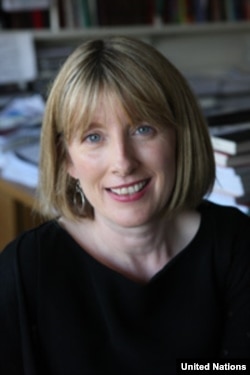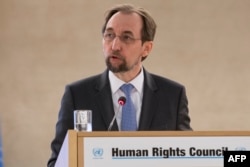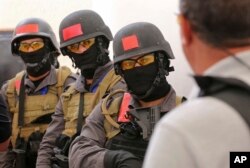Governments around the world are using the threat of terrorism as a justification to crack down on human rights defenders and civil society activists, the U.N. special rapporteur on the promotion and protection of human rights warned this week in Washington.
"I remain deeply concerned in my role as special rapporteur that civil society groups are being targeted by national security laws and administrative procedures for engaging in legitimate activities that are protected by international human rights law," Fionnuala Ní Aoláin said in a speech Thursday at the Center for Strategic and International Studies in Washington.
"The harassment, suppression, detention and killing of civil society activists, lawyers and human rights defenders cannot be accepted and legitimized by reliance on national security excuses or doctrines," she added.
Ní Aoláin warned that many counterterrorism measures used by governments could actually fuel extremism and politically motivated violence because, she said, they are being enforced at the expense of undermining freedoms and violating human rights.
This was not the first time that human rights officials and experts had expressed concerns about the misuse of counterterrorism measures by certain governments around the world.
Measures found to backfire
A two-year study released in 2017 by the U.N. Development Program (UNDP) found that measures deployed by African governments to combat terrorism drove more people to join violent groups.
Journey to Extremism was based on interviews with more than 700 people, nearly 600 of whom were voluntary or forced recruits of extremist groups in Kenya, Somalia, Nigeria, Sudan, Cameroon and Niger.
State violence and abuse of power serve as a "final tipping point" for the people to join extremist groups, the study suggested.
"Militarized responses to violent extremism have only served to deepen long-standing mistrust and alienation," the U.N. report said, adding that many African countries have used counterterror agendas to limit the space for political opposition and suppress civil society and the media.
Last month, Amnesty International released a report arguing that space for civil society continued to shrink across Europe. It criticized several European countries for imposing "discriminatory counterterrorism laws" through the EU Directive on Combating Terrorism.
'Vague' terrorism definitions
Amnesty said some countries, especially Turkey, use "vague definitions of terrorism" to persecute activists and human rights defenders.
Turkey is often criticized for bringing terrorism charges against those who oppose President Recep Tayyip Erdogan's rule or express sympathy for the country's Kurdish population that is seeking autonomy.
The U.N. on Tuesday called on Ankara to end its 20-month-old state of emergency. It contended that the emergency declaration had led to the arrest of nearly 160,000 people and to the dismissal of nearly the same number of civil servants, which the U.N. said amounted to "collective punishment."
Turkey resorted to mass arrests and dismissals following a failed coup in July 2016, but it has rejected the U.N. allegations, claiming its actions were taken to protect its citizens from terrorist organizations.
The Turkish foreign ministry said in a statement Tuesday that the U.N. accusations were unfounded. It asserted that Zeid Ra'ad Al Hussein, the U.N. human rights envoy, was teaming up with terror groups.
"This person [Al Hussein], who is the head of an international body bearing an unquestionable global importance, has unfortunately relegated the said U.N. body under his administration into a position of being a collaborator with terrorist organizations. We condemn this situation. We are also saddened because of the damage inflicted on this universal organization," the statement said.
Lack of clear definition
According to Ní Aoláin, lack of a clear definition of terrorism in international law is at the heart of why counterterrorism measures can lead to a rollback of freedom and human rights more broadly.
"What we are seeing is an epidemic across the globe of loose, vague and highly problematic definitions of terrorism. ... The result is, in practice, the term 'terrorist' or 'extremist' is increasingly defined in many countries as those who simply dissent, those who disagree, those who offer oppositional views, those who challenge the purity of the ethnic composition of the state," Ní Aoláin said.
Ní Aoláin's comments came ahead of an expected U.N. meeting in June to lay out a new global counterterrorism strategy.
Human rights organizations are likely to pressure governments to secure more space for civil society in the new strategy. The current strategy, adopted in 2006, emphasizes the importance of protecting human rights and freedoms by states as complementing and mutually reinforcing the fight against terrorism.
Rights activists say the strategy lacks punitive measures, however, for countries that violate those rules.
A new report at the Center for Strategic and International Studies, Counterterrorism Measures and Civil Society: Changing the Will and Finding the Way, recommended that governments should undertake legal reforms to ensure that definitions of terrorist acts are narrowly crafted to avoid ambiguity.
The report said countries with a history of open civic space could help protect human rights by conditioning the sale of weapons and arms to governments that abuse counterterrorism laws for silencing opposition.
Shannon Green, one of the report's authors, said expanding the space for civil society also could help millions of people in areas affected by war. She cautioned that the increasing pressure of counterterrorism measures has limited space for aid organizations.
"When these counterterrorism measures impact the ability of humanitarian organizations, development organizations or peace-building organizations to access those areas to offer that help, it has very concrete effects on people's ability to get clean water, their ability to get enough food to feed their families and keep them well-nourished, and to access lifesaving medicines," she said.







